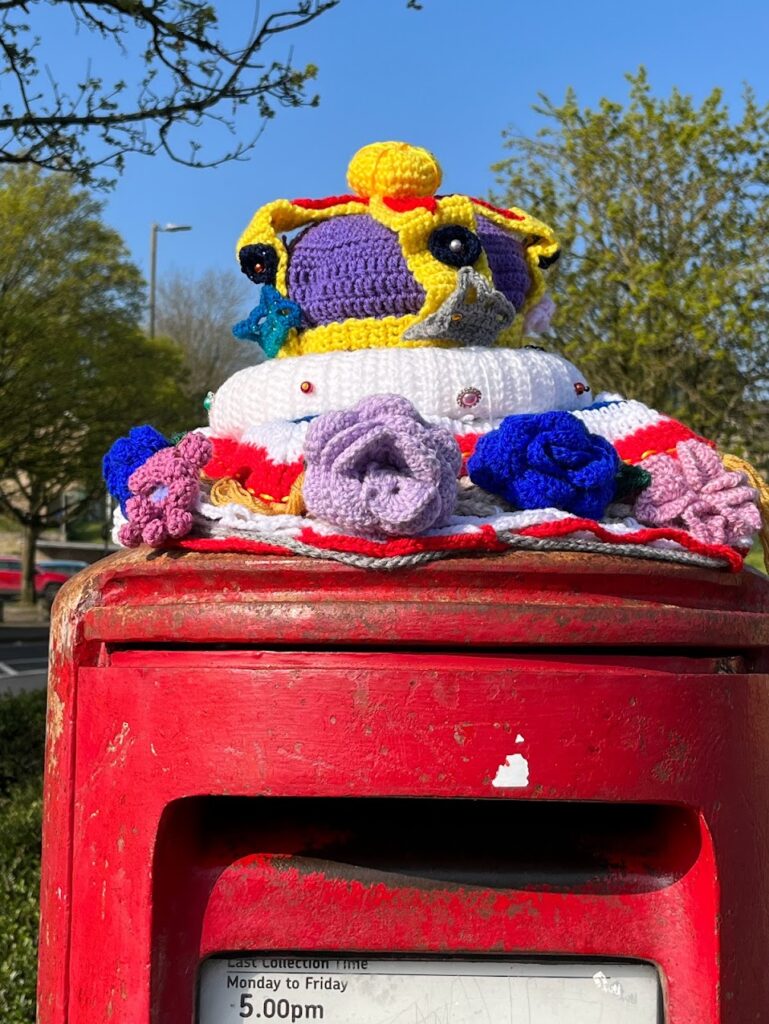This Week’s Bit of String: A world of queens
Years ago my kiddo emerged from a swimming pool changing room and treated me to this fabulous idea:
“The reason I took so long was because I invented a new musical. It will use the music of Queen and be all about if history had queens instead of kings.”
How would the British empire be different as a matriarchy? If there had been a Henrietta VIII, for example, would she have gone through 6 husbands? Some of the queens they did have were pretty brutal. Would they have felt less pressure to be so if they weren’t sandwiched between kings?
I suspect the ruthlessness lies not in gender but in unquestioned power, in the philosophy that there’s a divine right to rule for a particular bloodline. How then could a monarch, male or female, not believe they’re better than everyone else? Why should they genuinely take interest in what goes on for any of their subjects?

I can’t help thinking about these things with the coronation of the new king. It’s a rather inescapable affair. As an immigrant living in Britain, I was initially bemused by the knitted crowns on top of Royal Mail letterboxes and the bunting strung across main streets. One of my favourite cottages to walk past put up signs saying, “Party like royalty.” Cute.
Then there were £10 souvenir brochures for sale, and you can’t get a chocolate bar without a shiny crown stamped on it, and the public are offered the “opportunity” to participate in the coronation by swearing allegiance to the king… It became unsettling. Especially considering the monarchy’s cruel legacy of colonialism and the slave trade, and the current cost of living crisis.
Class Differences
When the queen died, it was a day or two after the Conservatives made Liz Truss prime minister, and during the first week of school. When you’re running around making sure your students actually have lunch to eat, swapping in new unelected leaders for old ones does not impress you.
I don’t begrudge people whatever small pleasures they find in life. Clearly some people enjoy celebrating the monarchy. I wish they could get that feeling from other things. It’s like my Year 12 student not wanting to join a cooking class in making burgers, because she’s convinced nothing can be better than MacDonalds.

Shouldn’t bluebell-carpeted woods, chips from the local takeaway, maybe a trip to a local production of ChittyChittyBangBang, make Britons feel proud of their country rather than a random guy donning ridiculously expensive headgear?
Many are concerned about the massive cost of this event. I’m happy for the children of our parish if they enjoy the hula hoops our council decided to gift to every schoolchild to mark the occasion. I’m glad if people like getting together for town-funded street parties. But the district Child and Adolescent Mental Health Service, for example, has a waiting list of more than 200 young people with acute needs. Hula hoops are fun, but so’s cake and there’s a reason no one liked it when French royalty said, “Let them eat cake.”
Story Selection
I don’t read much about the royal family. I got fed up with it as an adolescent in the mid 1990s when Princess Di or Fergie or the American equivalent, JFK Jr, were constantly on People magazine covers. I do think it’s fascinating how being born to that level of privilege and scrutiny would affect a person and their relationships. There’s a wealth of opportunity for stories there and many have utilised it. For me though, other stories are so much more crucial.
I hope everyone remembers that the queen wasn’t the only person who sacrificed and toiled in WWII; pretty much everyone I cared for in my nursing home job a decade ago did. King Charles isn’t the only person who helps with good causes. So many unsung heroes work hard, or run food banks or volunteer at youth centres or take in refugees.
I’ll spend much of today on housework and editing my novel’s penultimate chapter, featuring the voice of a refugee girl struggling in a new land. It is different from the chapters told by Eve herself, and I must make this extra, incredibly important voice work. I also plan to visit the swimming pool. It probably won’t be too crowded today while children are forced to sit at home near the telly. I hope they come away with wild ideas about how things could be different.
Will you be celebrating anything today?

